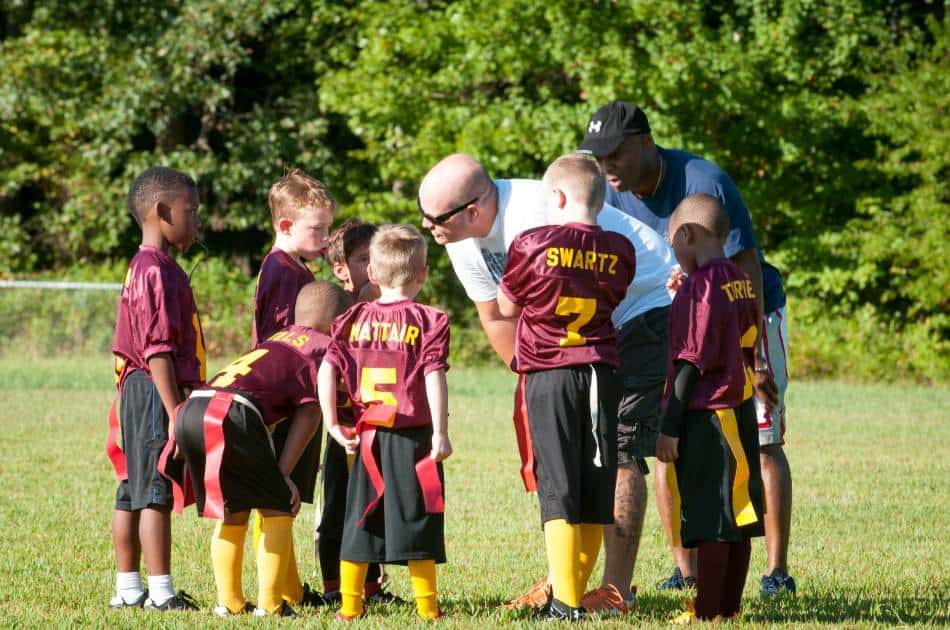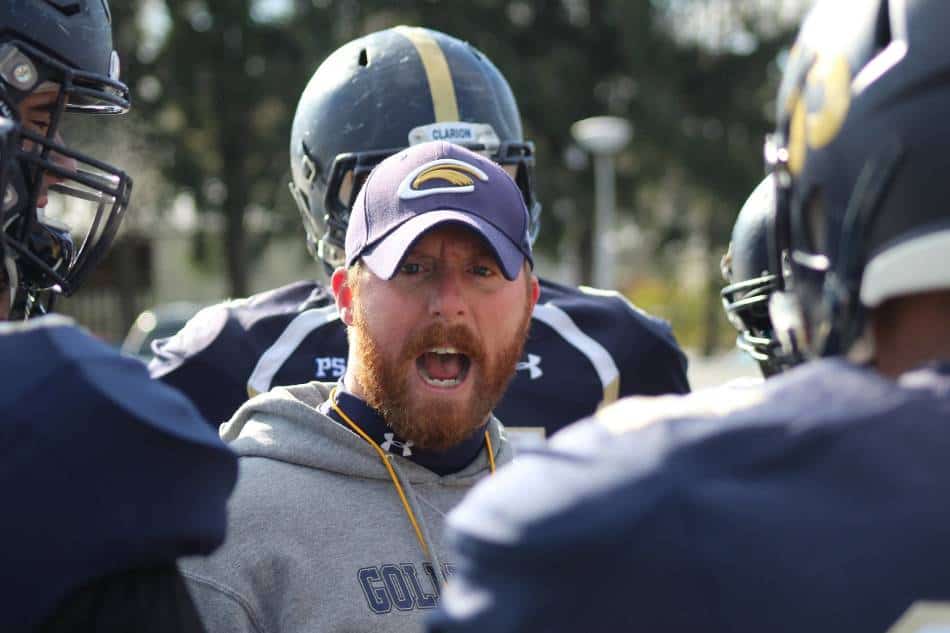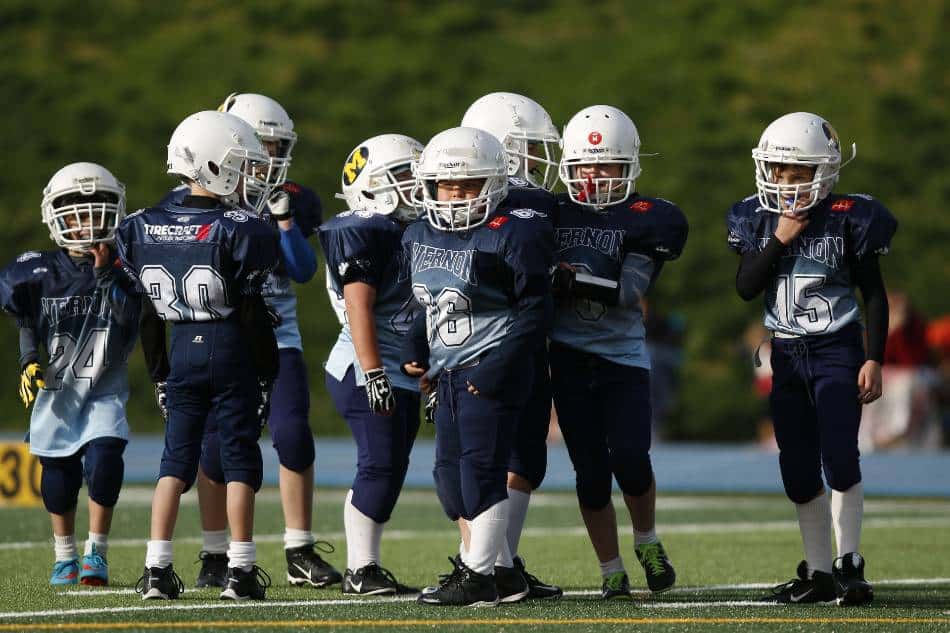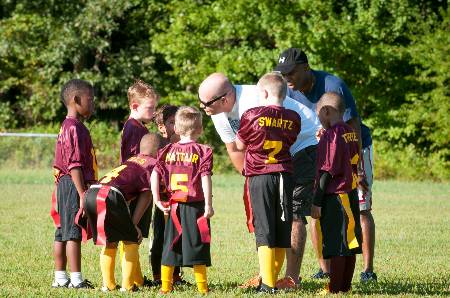
After my first season of coaching, I sat down to think about what I learned and could improve upon going into my next season. Realizing some of my shortcomings, I decided to create a list of tips for future first-time coaches.
What are some tips for first-time sports coaches?
Preach the fundamentals and end practices on a positive note. Don’t overtalk. Keep kids active. Most importantly – have fun! There’s no secret formula to becoming a good coach but there are a number of things you should keep in mind when coaching.
As someone who was a first-time coach, I encourage you to read on to make sure you’re coaching career gets started on the right foot!
Preach the Fundamentals
It’s paramount that your players have a good grasp of the fundamentals before you go into advanced topics. Building off the previous steps before moving on to more advanced topics is known as scaffolding.
The fundamentals serve as building blocks for everything a player learns. It might seem cliché to say fundamentals are everything, but there’s a lot of truth in that saying.
Keep Kids Active
Always keep your kids moving and engaged during practice. Nothing is worse than only engaging a couple of players while the rest look on. Even if they’re not the focus of the activity, make sure the other kids are engaged.
For example, during batting practices you can have kids shagging balls, hitting off a tee and taking soft-toss all at the same time. You want to maximize your time with your players and watching one kid go through drills won’t accomplish that.
Learn About Your Players
Take an interest in the lives of your players. Figure out what makes them tick. Learn about their goals and help them create new ones. Figure out how much they play Fornite, and make sure to give them a hard time about it.
Players will appreciate your efforts to learn about them away from sports and will in turn want to know more about you. Coaching is all about bonding with your players. Winning is important and fun but it’s not the only thing that matters.
You Can Learn a Ton from Losing
Losing should hold an important place in all our hearts. We’ve all been a loser at one time or another. Losing offers us an opportunity to better ourselves. Embrace that opportunity. Pick yourself up and figure out what went wrong.
This will help you key in on where you can improve and stop yourself from doing the same thing over and over again expecting different results. That’s the definition of insanity.
Don’t Try to Be Perfect

You and your players need to understand that perfection doesn’t exist. Please don’t hold yourself and everyone else to an impossible to reach standard. Instead, embrace the flaws of your players and work with them on correcting the issues they’re experiencing.
Only through hard work can we truly correct our errors. Try not to be too hard on yourself when you make errors coaching. You’ll have plenty during your first coaching experience.
Make Having Fun a Priority
Have fun as a coach! You’re being active and you’re helping kids better themselves. What’s not fun about that? Well, everything if you don’t like being around kids or doing physical activity.
Luckily you love both those things. Having fun as a coach can be as easy as showing up to practices and games. These venues offer you the perfect opportunities to destress and create better players.
Always be Yourself
Talk to your players like you’d to a good friend. Be yourself and respectful at the same time. Even though your players are half, a third or even a fourth your age…they still demand your respect.
Give it to them by being yourself. You’d be surprised how much a positive impact a coach can have on their players when they come across as relatable.
Make Custom Handshakes!
Custom handshakes are the new hot thing! They help you bond with your players and show that you’re a real person. By taking the time to create specialized handshakes, you’re going to build trust with your players.
This trust allows kids to better relate to you and it gives you more credibility in their eyes. I encourage you to create other fun exchanges with your players to further your relationships.
Try Not to Talk at Length
New coaches like to talk at length about how to do things. This is often counterproductive. There’s only so much you can say regarding a topic before ad nauseam.
Instead of telling a kid every step involved with kicking a soccer ball and all its intricacies, give them a quick overview and show them some examples. This pertains to any sport.
Unless kids are first-timers, they likely know the basics involved with the sports they play. Give your players a long leash and help them when they look like they need additional assistance.
Break Into Groups

Don’t be afraid to split players into groups. Practices should revolve around situations players will find themselves in games. If you have a kid that players linebacker in football, it doesn’t make much sense for that player to catch passes from the quarterback in practice.
They can play catch in their spare time. Practices should serve as simulations of games. Players should work on the things they’ll encounter during the game. I’d suggest breaking your players up into three or more groups during practices to work on certain skills that pertain to them.
Always End Practice on a High Note
Much like the evening news, we want to end practice on a high note. This makes the kids want to come back the next day. If you’re running your kids from foul pole to foul pole the whole practice, they’re probably not going to be thrilled about attending future practices.
Something like this probably wouldn’t affect the participation of high school kids but it will likely deter the younger kids. I’m not saying making your players run is bad but happiness goes a long way in getting the most out of a player.
Bond with the Parents
You should meet with the parents early on to convey your expectations and answer any questions they may have. The first practice works as a great avenue for this. Tell the parents what they can expect of you and give them an idea of your coaching style.
If I was giving the speech, I’d tell the parents that my priorities are safety, everyone having fun and that everyone should get better by the end of the year.
If you’d like, you can use this opportunity to see if any parents would like to help you out with coaching. This could be in an assistant role or just helping prepare the field before practices and games.
Lastly, parents need to know that their children aren’t professionals. Neither are the officials they like to berate. Parents should focus on their kids having fun and improving as an individual, rather than worrying about their chances of going pro.
Build a Network of Coaches
Take notice of what other coaches are doing and ask them questions when opportunities arise. You can learn a lot from others by having an open mind and an eagerness to learn.
These traits will benefit you throughout your whole coaching career because there’s always something new you can learn.
Find a Mentor
Find someone who has plenty of coaching experience and ask them to mentor you. Finding a mentor isn’t too difficult, especially if you already have someone in mind. If you don’t have anyone in mind, work on networking and you’ll find someone.
Mentors are great because they’ve been in your shoes and can help educate you, they’re an open book in the advice department, they give second opinions and they help you focus on the things that matter.
Enrich the Lives of Your Players

We want our players to leave the team as better individuals. If by the end of the year, our players aren’t better players and people in general, we’ve failed at coaching.
It doesn’t take a lot to make these things happen if you put in the time and show that you care. It sounds cheesy but these things go a long way. I’m sure you had coaches that you fondly remember from your playing days.
I’m sure you also had some coaches you wish you could forget. Strive to be a coach your players will say good things about in 20 years.
Set the Tone
Set the tone through your actions. Show up early and ready for practice and your players will follow suit. You don’t have to be super intense during practice but let your kids now you’re ready to put in work.
Kids that show up late to practice don’t necessarily need to be punished, but I would prioritize the playing time of players who show up on time over ones that don’t. The kids who routinely show up late will eventually grasp what’s going on and get the picture.
Push Your Players
Everyone needs a little push. You can’t get better if you’re not testing your limits. Instead of having your players do the same drill continuously, throw in some modifications to the drill and test your players’ abilities.
This will keep them engaged and their skills will continue to improve. Other ways to push your players during practice could include incorporating conditioning and scrimmaging teams that are better than you.
Listen to What the Kids Have to Say
You can’t expect your players to listen to you if you’re not willing to listen to them. Find out what they enjoy the most about your coaching practices and incorporate more of those things. If you’re unsure of how something was received, ask your players.
They’ll let you know how they feel and you can decide from there. Also, watch your players’ body language. If kids are dragging their feet and not paying attention, it’s probably time for a water break or a team huddle.
Coach for the Right Reasons
Make sure you become a coach for all the right reasons. If you love the smell of a freshly raked infield and the sound of someone dribbling up-and-down the court, coaching is probably for you.
You get to impart life lessons on kids and become immersed in sports that you love. There aren’t many things better than that!
You Can’t Predict the Future
As a coach, you’re never going to have all the right answers. Accept your limitations, learn from them and move on. One of the worst things you can do is let these mistakes live in your head instead of working to correct them.
Your players won’t expect you to have all the answers. Be yourself, attentive to their needs and show that you care about them and they’ll look forward to seeing you at all the practices and games.
